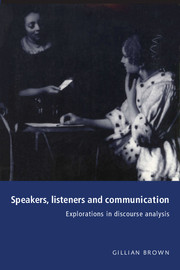Book contents
- Frontmatter
- Contents
- Acknowledgements
- Transcription conventions
- Introduction
- 1 Speakers, listeners and communication
- 2 The Map task method
- 3 Identifying features in a landscape
- 4 Guiding the listener through the landscape
- 5 The Stolen letter task: understanding reference to individuals in a narrative
- 6 Understanding narratives
- 7 The listener and discourse comprehension
- Epilogue
- References
- Index
Epilogue
Published online by Cambridge University Press: 05 June 2012
- Frontmatter
- Contents
- Acknowledgements
- Transcription conventions
- Introduction
- 1 Speakers, listeners and communication
- 2 The Map task method
- 3 Identifying features in a landscape
- 4 Guiding the listener through the landscape
- 5 The Stolen letter task: understanding reference to individuals in a narrative
- 6 Understanding narratives
- 7 The listener and discourse comprehension
- Epilogue
- References
- Index
Summary
We have explored a range of basic questions in communication, examining the notions of communication, reference and context, and emphasising the role of the listener in communication rather than concentrating on that of the speaker.
We have seen, in the data presented here, examples of apparently fully correct interpretation by listeners, as well as a wide range of examples of apparently adequate and apparently inadequate interpretation, and we have speculated on the reasons for this variation. The Map task method has permitted us to address the points raised in 2.1 as possible reasons for a listener failing to respond adequately to what a speaker has said. It allows us to distinguish between occasions when a listener has apparently not heard what the speaker said, has heard but not interpreted what was said, has heard but not interpreted until later on what a speaker said, or has heard but not understood (all of) what a speaker said. We have seen many occasions when a listener selects just some part of the speaker's utterance to pay attention to, because only that part was relevant to the listener's current intentions, since for the listener, understanding what the speaker said is only a means to an end — and for the listener, it is the listener's end which is at issue.
- Type
- Chapter
- Information
- Speakers, Listeners and CommunicationExplorations in Discourse Analysis, pp. 234 - 236Publisher: Cambridge University PressPrint publication year: 1995



